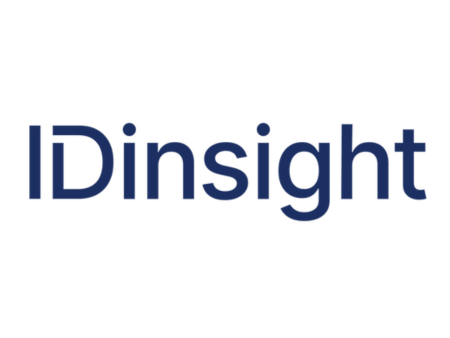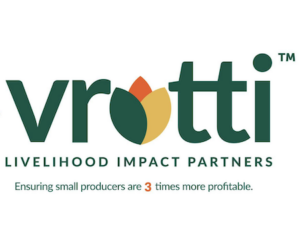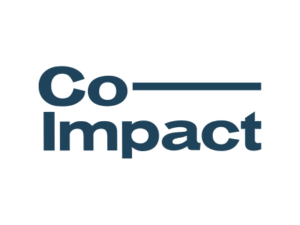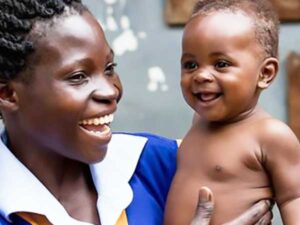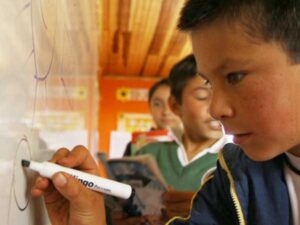IDinsight is a mission-driven data analytics and research organization that helps global development leaders maximize their social impact. They work with governments, multilateral agencies, foundations, and innovative non-profit organizations across sectors in Asia and Africa. Working across a wide range of sectors, including agriculture, education, health, governance, sanitation, and financial inclusion.
Esther Wang of IDinsight spoke with Ashley Hopkinson on November 28, 2023. Click here to read the full conversation with insights highlighted.
Ashley Hopkinson: Can you introduce yourself. Also, can you share the problem that IDinsight was developed to solve and how do you see the organization actively solving it?
Esther Wang: My name is Esther Wang and I am a co-founder of IDinsight. We started IDinsight twelve years ago, and I’ve returned recently to serve as part of our Interim Executive Team.
The problem we were trying to solve twelve years ago is much the same as it is today: there are powerful data and evidence tools in the world that can help those in the social sector improve their impact, but oftentimes they are not readily available or used when they’re needed most.
Often policymakers and program teams within non-profits need to make time-sensitive decisions — that are often life and death and directly affect suffering and quality of life for communities — But they often don’t have the right data or insights on hand at the right time to inform those decisions.
We have been and are still filling this niche of bringing the best data tools to inform decisions about critical challenges. As the world has evolved, our tools have become more powerful, more sophisticated, and IDinsight has needed to continue evolving. I see our work as leveling the playing field by bringing, for example, high-quality surveys, impact evaluations, data science, machine learning, and gender-sensitive research methods to practitioners whose work can be dramatically improved with data and evidence insights. It is really an equity issue that we are trying to solve for – data and evidence can level the field so that insights from representative data are informing policies and programs.
We support our partners in making as much impact as possible by supporting them in their decisions on how to allocate their scarce resources, and move forward with confidence that they’re getting the intended impact that they were created to do. We’re part of this group of organizations in the social sector that are really more like amplifiers. We’re not direct service, but we bring impact by supporting other organizations to do more and better.
Ashley Hopkinson: Who benefits from your work and how do they benefit?
Esther Wang: We work with nonprofits or NGOs; we also work with many governments around the world, philanthropies, international agencies, and social businesses. I’d say in all those cases we’re looking at what decisions need to be made, then we help bring the creative technical tools to get the right data and evidence within that context and setting.
Ashley Hopkinson: What makes IDinsight distinctive in this field of social entrepreneurship? What is unique about the organization?
Esther Wang: There’s actually no one else doing exactly what we do in the way that we do it.
We — as an advisory and research firm who’s bringing special expertise — are entirely demand-driven, so we don’t have our own agendas, sectors, or publishing goals. We work with clients on what keeps them up at night.
Our approach is also that we are really locally grounded and yet world-class in our approaches. We have teammates who are living in or are from the places where you really need context to understand the challenge, and they’re also bringing the absolute best analytical and technical approaches.
We are laser-focused on impact. We choose our work based on how much impact is possible, how much we can bring ourselves. We also reflect on whether we are the right organization to provide support. As the world changes, the questions change and the problems change, so we have to keep finding the best tools to use to respond, and support in that context.
Ashley Hopkinson: You had mentioned that you’re not there for a specific agenda or a particular sector, but you’re tailoring your approach to the organization that you’re working with, or the client that you’re working with. I wonder if you could pick a story that serves as an example of the impact that you’re having?
Esther Wang: One example is our work with an NGO called Educate Girls in India.
Educate Girls look for girls who are out of school to bring them back into the education system. We’ve worked with them over a number of years and through quite a few phases. We’ve loved this partnership because we’ve gotten to work with them closely through a series of questions and challenges they’ve faced. We call these learning partnerships, where it’s not just one task and we drop in and then leave. It’s really this collaboration of understanding what keeps them up at night and what next big decision they need to make.
First thing we did was evaluate a development impact bond they were a part of, and after that evaluation, we saw new opportunities to help them improve their program implementation.
We’ve also helped them build a monitoring dashboard, so they can really track how they’re progressing against their goals over time using predictive analytics and machine learning to analyze publicly available administrative data in order to target and identify communities with the highest rates of out of school girls. As a result of applying this cutting edge tool, they were able to identify 2.5x more girls than they would’ve found if they had just gone village to village asking around. Using this algorithm, we estimated that they could reach 60,000 more girls for the same cost. It really transformed how much impact they could have, and in fact, that innovative tool was actually featured in the Stanford Social Innovation Review (SSIR).
Ashley Hopkinson: How, as an organization, does IDinsight measure success? How do you know you’re advancing the goals that you set out to achieve?
Esther Wang: It’s a great question and one that is not easy for an organization like ours to answer since we’re not a direct service provider.
We have a pretty intense methodology and technical approach to help us think about our own impact: we look at the breadth of how many lives we touch in each project we do, and the depth of how much we’ve affected or improved that life, then we actually attribute to IDInsight’s contribution to our program collaborations. There are various technical iterations, and we’re really conservative about how we think about our impact. But we roll that up to try to understand our impact over time so that we can learn how to become more impactful.
For us, the holy grail has always been whether a different decision was made based on the data or evidence that we brought and what would have been the counterfactual if IDInsight had not been involved. We ask questions at the beginning of each project to reflect on whether we should do that work, the value of our engagement, and the potential impact of doing that work. The biggest measure of impact is whether the outcome could be different and better through our collaboration with a partner.
Ashley Hopkinson: Is there something that, as an organization, you’ve tried that didn’t work or didn’t quite meet expectations, and what was the learning from that?
Esther Wang: One of the lessons that I talk about a lot internally is that even though we work in the space of data, evidence, and numbers, it still comes down to relationships, people, and the ability to make change. It doesn’t matter if your numbers are right or are the best numbers out there, the human element is still necessary to change a system and convince people that something different is around the corner.
We’ve seen that in a lot of different contexts; relationships are paramount. For example, in many or our contexts we work with governments where the point person that has invested a lot into a project leaves or is reassigned. Suddenly, without the relationships with the other people in the organization, it doesn’t matter how great the research or data was, the work won’t be picked up in the same way. Alongside quantitative work, we need to invest in developing strong skills and understanding around what motivates a person to ask a question, to act on an answer, and to carry through on a plan. It’s been a critical lesson for us when we measure our success on decisions and actions taken.
Ashley Hopkinson: What would you say is the biggest insight that you’ve gained across data science as a whole?
Esther Wang: An upfront understanding of who is the audience and what is the goal of the work.
We see that when implementing within large systems that have complex stakeholder engagements. We have to understand how numbers will interact across different stakeholders and their perceptions.
There are powerful tools that can be used in a lot of different ways, and sometimes, there’s a temptation to have them be the answer to everything which only traps you into not actually being able to answer anything. We need to ask questions about the goals of a particular case and what it is that the clients need. One must be clear on the purpose of the quantitative exercise. There’s a lot of noise that data can cut through, or it can actually create more noise.
Ashley Hopkinson: Data can cut through noise or can create noise. I’m going to remember that. Do you see IDinsight working to advance systems change, and how specifically are you doing that?
Esther Wang: We were founded with a principle that we are trying to improve lives in a broken system that’s missing a lot of data, that isn’t collecting the right data, and that doesn’t have the right tools in the right places. We’ve always wanted to break and fix and improve the whole system of how decisions are made in the social sector in service of the most vulnerable people in the world.
How we do that I think is by showing the proof of concept: having real examples of what could’ve been if you hadn’t used these tools or thought about the questions where data can fit in or can be better. It’s about creating demand for different ways of making decisions; not settling for poor data, fogs of uncertainty, or decisions based on anecdotes.
On a more micro level, with gender for example, IDInsight can play a role in both identifying the problem and measuring the potential impact: showing that there are gender gaps, identifying where those gender gaps are, and narrowing those gaps. What we’re doing is underpinning the case that is being made to change various systems, meanwhile, we algo get to participate across a lot of different kinds of systems too.
Ashley Hopkinson: What would you say is needed from other actors or players in this space to help support and advance systems change in this area?
Esther Wang: There are a lot of important parts of the sector that need to demand a higher quality of evidence and data, and hold that as the standard with which we operate.
For example, a lot of philanthropies and funders are getting more sophisticated by asking the questions and supporting their grantees in measuring what needs to be measured, and move forward with that confidence and visibility.
Data is changing the way we’re able to understand and operate within the world, and to tell stories and show examples. Governments need to example the best tools that could influence national decisions and critical budgetary decisions. There needs to be a culture of great evidence being built into the DNA of the sector. That’s what we’re trying to do: bring forward the best approaches while also being creative and innovative. We aim to make it feasible and possible for organizations to have the best data.
Ashley Hopkinson: What challenges have you faced or are currently facing in this work?
Esther Wang: There’s plenty of them, but one I would highlight is around scalability. We pride ourselves on tailoring our work to our partner organizations, but as a result, there are only so many people at IDInsight that can’t accommodate all of the demand. We’re exploring how we can serve more organizations that don’t require such a high touch and intense collaboration — which is really labor intensive and requires a lot of people and talent. One thing we’re still working through is the possibility of a version of what we do that is open sourced and could be DIY [do-it-yourself] for organizations.
There are a lot of smaller organizations that might not be ready for a partnership with IDInsight; it’s an investment that requires a lot of attention and energy too. We’re considering how we might support them at the earlier stages.
Ashley Hopkinson: In reference to DIY, or open source, what can someone access at level one when maybe IDinsight represents a level five. Have you gained any traction in working toward that or are these current conversations?
Esther Wang: We are innovating and trying out new things. We have something called the M&E [Monitoring & Evaluation] Health Check, which is a free website that organizations can go to and get a diagnosis of where they are in their M&E journey, and what tools might be useful for them.
In all honesty, we have this tool, but we’re still trying to figure out how to pair support with that, so someone really truly can get the most out of a diagnosis. We’re on the journey. We want to be as useful as we can be to all different kinds of organizations; there are just business constraints about how much we can do, and we’d love to break those.
Ashley Hopkinson: How do you see IDinsight evolving in the next five years?
Esther Wang: I think that in the next five years, the world and the world’s problems will become even more interconnected and small. There was a time when it felt like India had a different set of problems and solutions than maybe parts of Sub-Saharan Africa did, or vice versa.
Because of the information transfer and the mobility of learning around the globe, the world is getting much smaller. It’s really exciting as this leads us to the need to be really nimble with tools.
We have been really responsive to the kind of questions that our clients need us to help them answer; we’ve had to come up with different technical approaches, creative tools, and applications. I think that’s going to continue in the next five years.
As the tools become more powerful and sophisticated, the problems may become bigger and more global. At the same time, the data is going to become more powerful and I hope more accessible if organizations like us are able to keep bringing it to the places where it’s most needed.
Ashley Hopkinson: One thing that I wanted to ask that I’m just genuinely interested and curious about is, what would be your pitch for the significance of data science in the field of social change?
Esther Wang: Data science is one of the tools we use, but I’d probably call it good measurement, or good data, in general.
There is a difference between measuring something because you have to and then not using it versus measuring something for the purpose of decisions. We always say not to measure a hundred indicators. Be very clear on what part of your theory of change you most need to track, then figure out how to track that extremely well. You’ll be better equipped to know the direction you’re headed early and be able to change course as needed.
There’s so much measurement out there that is not useful; it is not done well and wastes resources. Use data as a tool to guide every decision that you’re making on this journey rather than something you use to measure something after the fact. It can be the most important tool for an executive trying to decide how to use limited resources or save/improve as many lives as possible.
Ashley Hopkinson: I love that. Thank you for taking time to share that with me.
Click here to read the full conversation with insights highlighted.
Ashley Hopkinson is an award-winning journalist, newsroom entrepreneur and leader dedicated to excellent storytelling and mission-driven media. She currently manages the Solutions Insights Lab, an initiative of the Solutions Journalism Network. She is based in New Orleans, Louisiana.
* This interview has been edited and condensed.
Find other organizations supporting global leaders in social innovation.

